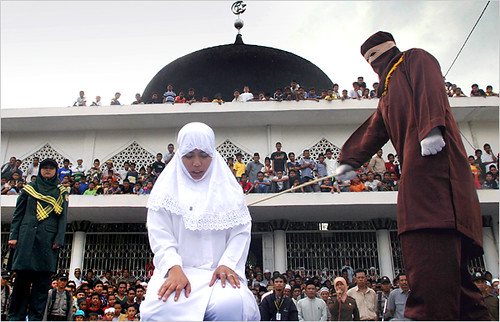
An interesting article in the New York Times today asks, Is Islam compatible with democracy? It’s a fairly important question, considering that the current justification for our little misadventure in Iraq is that we’re “promoting democracy.” Of course, “promoting democracy” is the justification that we got after “finding weapons of mass destruction,” “combating human rights abuses,” and whatever other excuses they made up. But I suppose that’s beside the point. The author of this piece uses Indonesia as an example of a majority-Muslim country where democracy has not proven quite the ideal system that many politicians and talking heads would like us to believe. Radicalism is, if not spreading, at least getting louder. Conservatism is more common. Democracy has allowed fundamentalists a new platform on which to speak.
I don’t see any reason why Islam and democracy can’t work together — but I can see why religious fundamentalism of any stripe would be incompatible with democracy. And I can see why fundamentalism is taking hold in majority-Muslim nations around the world. American culture has long been exported abroad, to the chagrin of many people who don’t like seeing their own culture overwhelmed by golden arches and Barbie dolls. And now, from the perspective of someone in, say, Indonesia, it looks like the American military is invading Muslim country after Muslim country, killing tens of thousands of people and gearing up to invade even more (Iran? Syria?). That’s gotta seem awfully scary — and it shouldn’t surprise us when people who feel they’re under attack cling strongly to the characteristic that they believe is being targeted.
Think about post-9/11 America — the flags, the “never forget” bumper stickers, the general sense of unity and the resurgence of pride in being American. We were attacked, and we knew we were attacked not for being New Yorkers, or for being mostly Christian, or living in a democracy, but for being American. So we embraced that, we clung to it, and that American identity became a centerpiece in many of our lives in the subsequent days, months and years.
Now Muslims world-wide are feeling under attack because they’re Muslim. Every day they see footage of the invasions of Afghanistan and Iraq, and they see the Bush administration chomping at the bit to go into Iran. They see immigrant Muslims routinely marginalized and targeted. They see that the major unifying factor in these things is their religion — and so logically, religion is embraced, and the more extreme versions of that religion can thrive.
I’m not defending fundamentalist Islam — not even close. But this isn’t happening in a vacuum, and if we’re going to combat it, we need to look at the issue holistically. We also need to decide, as a country, which norms we’re going to embrace — those of human rights, or those of religious conservatism (as long as its the right religion, of course).
Not surprisingly, I fall on the human rights side, which means that all people deserve a set of basic rights, freedoms and liberties simply because they are people, and that these rights should not be compromised based on gender, race, religion, national origin, place of residence, sexual orientation, physical or mental capabilities, etc. This is where my feminism butts heads with cultural relativism — I don’t think “it’s their culture” or “it’s their religion” is a good enough justification for oppression. I don’t believe that’s an adequate justification here, when it’s conservative Republicans trying to limit the civil liberties of gay and lesbian citizens or trying to restrict birth control access or trying to legislate compulsory childbirth. I don’t believe it’s an adequate justification abroad, when it’s religious conservatives whose interpretations of Sharia law allow women to be stoned to death or punish rape victims for surviving the crime.
Fundamentalism and “because God said so” is pretty much always trouble — which makes it interesting to see U.S. conservatives criticizing human rights abuses in majority-Muslim countries, when those abuses are usually tied to conservative religious interpretations, and then trying to justify their own promotion of religion-based conservatism, which would also enable human rights abuses. They realize it’s a matter of degree, and find themselves attacking progressives who promote universal human rights, while also attacking those people who apply fundamentalist religious beliefs to government and law. And so the argument gets couched in terms like “Islamism” and only references Muslims, instead of approaching all human rights abuses and promoting a universal vision of basic freedoms and liberties for all people. It’s a losing formula. Religion is a convenient cover for abuse (and certainly for patriarchy), but it’s not the cause of it. Religion was created by people, to benefit a certain class of people, and it’s interpreted by people. It’s not a static force. If it weren’t religion, something else would be used to justify oppression. But religion is awfully handy, since all kinds of bad acts can be justified with little more than an appeal to the supposed desires of a supreme being. The problem, though, is oppression in general, which includes racist, patriarchal social structures around the world. Taking out oppression from Indonesia to Indiana requires a dismantling of those structures, not single-issue nitpicking at this religion or that one. That said, we must point out oppressive acts and regimes when they occur — and the caning pictured above is a prime example.